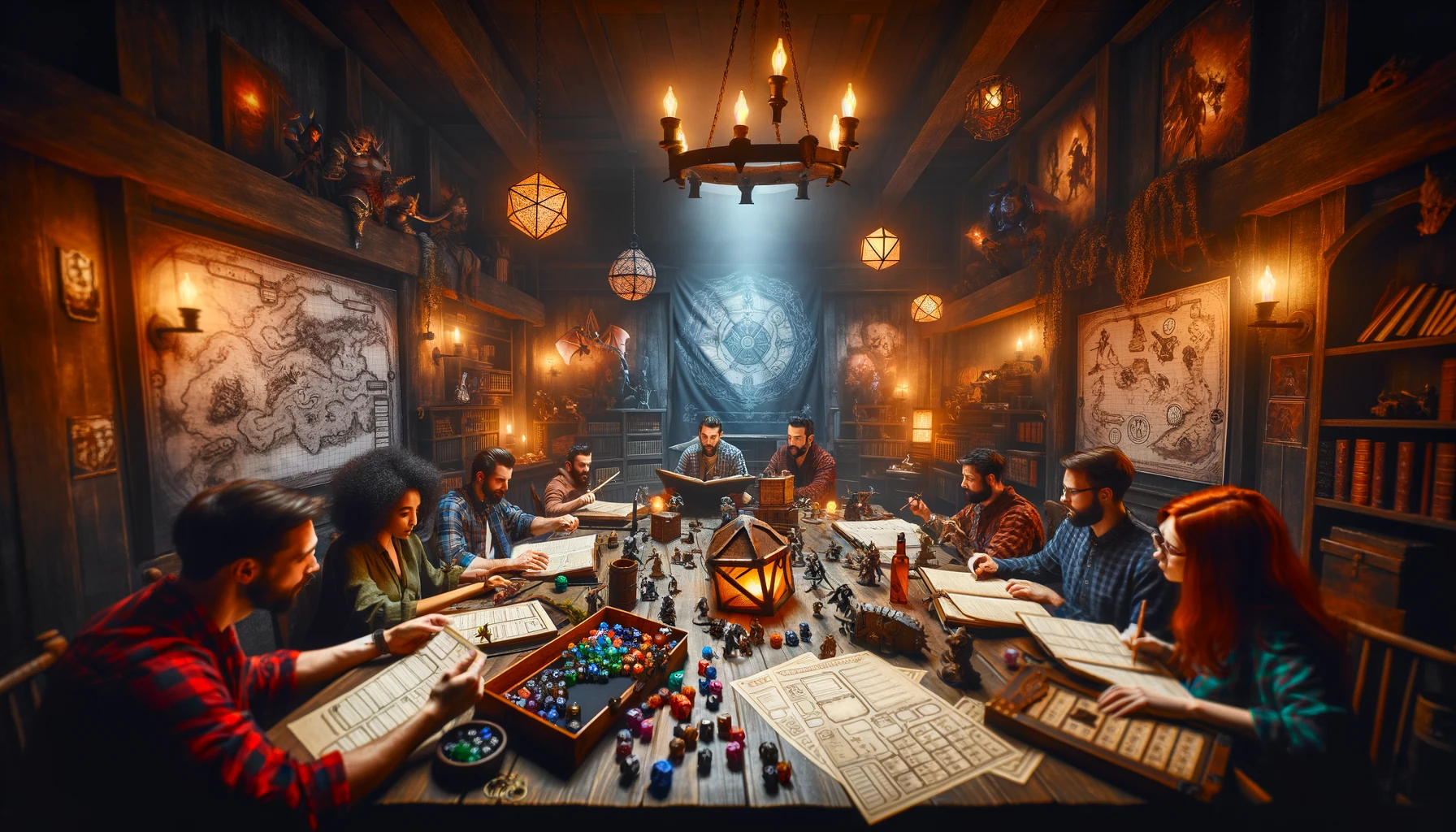Exploring TTRPG for 2024
Welcome to “Rolling Dice and Crafting Tales,” your gateway to the enchanting realm of tabletop role-playing games (RPGs)!
Here, we dive into the heart of these imaginative games, where storytelling and strategy intertwine to create unforgettable adventures. Whether you’re a seasoned dungeon crawler or new to the world of dice and character sheets, this blog is your companion on a journey through mythical lands, daring quests, and camaraderie.
From the classic Dungeons & Dragons to innovative new games, we explore the rich tapestry of narratives and mechanics that make tabletop RPGs a uniquely engaging experience.

Tabletop role-playing games (TTRPGs) have captivated the hearts of millions around the world, and for good reason. They offer a unique blend of storytelling, strategy, and social interaction that is hard to find in other forms of entertainment. At their core, RPGs are about stepping into the shoes of a character in a fictional world, creating a narrative together with other players and a game master. This collaborative storytelling is a powerful draw, allowing players to explore different personalities, scenarios, and outcomes in a safe and imaginative space.
The appeal of TTRPGs also lies in their flexibility and variety. From high fantasy worlds filled with magic and mythical creatures to futuristic sci-fi universes, RPGs cater to a wide range of interests and themes. This versatility means that there’s an RPG for almost every type of player, whether they enjoy intricate plots, complex character development, or thrilling combat.
Moreover, TTRPGs offer a social experience like no other. They bring people together, fostering teamwork, problem-solving, and creativity. In a world where digital forms of entertainment are dominant, RPGs provide a refreshing opportunity for face-to-face interaction, building real connections and memories.
Here are the most popular TTRPGs going into 2024
- King Arthur Pendragon, 6th Edition (Chaosium): A classic RPG that allows players to play as a lineage across generations, with campaigns spanning multiple eras.
- Dragonbane / Drakar och Demoner (Free League): A reimagined version of the Swedish RPG ‘Drakar och Demoner’, offering classic fantasy gameplay.
- 13th Age, 2nd Edition (Pelgrane Press): A game designed by lead designers of D&D 3E and 4E, known for its compatibility with existing books and public playtesting.
- Household (Two Little Mice): Set in an abandoned house where each room represents a 14th-century nation, where players undertake adventures as ‘littlings’.
- Mothership 1e (Tuesday Knight Games): A sci-fi horror game where players can be scientists, teamsters, androids, or marines, using a ‘Panic Engine’ for gameplay.
- Dread: A unique horror roleplaying game that uses a Jenga tower instead of dice to resolve challenges.
- Cy_Borg: A sci-fi dystopia RPG with elements of cyberpunk and horror, known for its simple rules and unique setting.
- Mörk Borg: A dark fantasy RPG set in an apocalyptic world, focusing on themes of survival and redemption.
- Legend of The Five Rings: Players become samurai in a world filled with Asian-inspired mythos, focusing on duels, battles, and character building.
- Warhammer 40,000: Wrath and Glory: Set in the 41st millennium, this game offers a deep dive into the Warhammer 40k universe, with a focus on narrative and combat.
Tabletop role-playing games (TTRPGs) offer a wide range of benefits, making them a popular choice for gaming and social activities.
Here are some of the key pros:
Enhances Creativity and Imagination: TTRPGs encourage players to think creatively, as they involve creating characters, worlds, and stories.
Social Interaction and Teamwork: These games are inherently social, requiring communication and cooperation among players, which helps build teamwork skills.
Improves Problem-Solving Skills: Players often face challenges and dilemmas in TTRPGs, fostering critical thinking and problem-solving abilities.
Flexibility and Variety: TTRPGs offer a vast array of genres and settings, catering to a wide range of interests and preferences.
Mental Health Benefits: Engaging in role-play can be therapeutic, offering an escape from daily stress and a safe space to explore different aspects of one’s personality.
Educational Value: TTRPGs can teach a variety of skills, including mathematics (through dice rolls and statistics), history, and language skills.
Inclusivity: Many TTRPGs promote inclusivity, allowing players to explore diverse characters and worlds, and providing a welcoming community for people from all walks of life.
Accessible and Affordable: While some TTRPGs require specific materials, many can be played with minimal equipment, and resources can often be found online for free or at low cost.
Promotes Narrative Skills: As storytelling is a key component, players often improve their narrative and storytelling abilities.
Long-Term Engagement: TTRPG campaigns can last for months or even years, offering long-term entertainment and deepening relationships among players.
FAQ’s
Do I need special equipment to play a TTRPG?
Basic requirements include the game’s rulebook, character sheets, and dice. Some games may require additional materials like maps or miniatures.
Can I create my own character?
Yes, most tabletop RPGs allow players to create their own characters, choosing aspects like race, class, and background based on the game’s rules.
How long does a typical session last?
Sessions vary in length but typically last between 2 to 4 hours. Some groups may play shorter or longer sessions.
Is it possible to play online?
Yes, many tabletop RPGs can be played online using platforms like Roll20, Fantasy Grounds, or Discord for communication and gameplay.
Do I need to be good at acting to play RPGs?
No, while some players enjoy acting out their characters, it’s not a requirement. The focus is on storytelling and collaboration.
Can I play a tabletop RPG solo?
Some RPGs are designed for solo play, while others may require adaptation. Many resources and guides are available for solo RPG play.
How important is the game master?
The game master (GM) plays a crucial role, facilitating the game, describing settings, and adjudicating the rules. However, player collaboration is equally important.
Can a tabletop RPG campaign be replayed?
Yes, campaigns can be replayed with different choices and characters, often leading to new experiences and outcomes.


